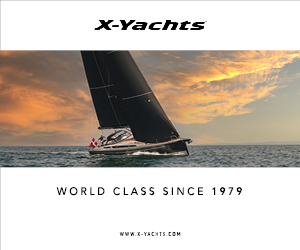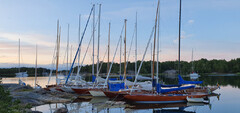Australia Strikes First Blow In 2009-2010 ISAF Sailing World Cup
Australian sailors won five gold medals as the host nation led the way at Sail Melbourne, first event of the 2009-2010 ISAF Sailing World Cup series. The Australian Sailing Team made the most of home advantage as they stormed to five gold, four silver and five bronze medals at Sail Melbourne, the first of seven events that make up the 2009-2010 ISAF Sailing World Cup series for the Olympic and Paralympic sailing events.
Whilst the Aussies were the undisputed top dogs, it was also a great start to the World Cup season for Canada, Colombia, the Netherlands and New Zealand which all picked up World Cup gold medals. In total 11 nations earned a spot on the podium at Melbourne which included the first World Cup medals for Colombia, Singapore and Norway.
The Aussie dominance came as little surprise, with the big names from the Australian Sailing Team living up to their billing as hot favourites. The Men’s 470 crew of Mat Belcher and 2008 Olympic gold medallist Malcolm Page repeated their runaway success of 2008, whilst reigning World Champions Nathan Outteridge and Iain Jensen also took gold in the 49er fleet. Canada also got reward from its star name performers with top-10 ranked Michael Leigh taking home gold in the ever-competitive Laser fleet, whilst Paul Tingley showed why he’s the reigning Paralympic Champion with a hard-fought win in the 2.4mR event.
The surprise performer of the piece was 19 year old Colombian windsurfer Nicolas Lozano who won the Medal Race to take home gold in the Men’s RS:X event. The first glimpse of Lozano’s potential came at the 2008 Volvo Youth Sailing ISAF World Championship, but it was not until this year when the young Colombian was selected for the Perth 2011 Emerging Nations Programme (ENP) that his star began to rise dramatically.
The ENP takes the form of a series of camps - run by Australian Olympic sailing coach Arthur Brett and Sydney Olympic Games gold medallist Belinda Stowell - for athletes who come from developing sailing nations and are aiming to compete at the Perth 2011 ISAF Sailing World Championships and ultimately the London 2012 Olympic Games. Lozano was selected to attend the second ENP Camp held in Perth earlier this month and has flourished in the professional training environment. Just before heading to Melbourne he scored a confidence-boosting win at the ENP Regatta in Freemantle and now his victory at Melbourne has propelled both himself and the early success of the ENP onto the international stage.
Like Australia, New Zealand was also able to take advantage of the Oceania-event of the World Cup, winning a complete set of gold, silver and bronze medals. The former Laser Radial rivals turned teammates, Jo Aleh and Olivia Powrie were particularly impressive, beating off the challenge of last year’s winners Stacey Omay and Chelsea Hall to take gold in the Women’s 470 fleet.
Another standout performance came from Dutch sailor Marit Bouwmeester who got the better the US star Paige Railey to win the Laser Radial title. Still just 21 years old, it hasn’t taken long for Bouwmeester to convert success on the youth circuit (she was the silver medallist at the 2006 Volvo Youth Sailing ISAF World Championship) onto the senior stage and she looks set to be a major challenger for the 2009-2010 ISAF Sailing World Cup title.
Next stop for the ISAF Sailing World Cup is Miami for US SAILING’s Rolex Miami OCR from 24-30 January. At Melbourne, the US Sailing Team AlphaGraphics made a solid start to their World Cup campaign picking up three silver medals, a tally they will look to build on significantly in Miami next month. Last year’s top World Cup nation Great Britain had a very small representation at Melbourne and won a solitary silver medal. Like the Americans, the British will have a far bigger presence in Miami and will be looking to make up ground on the high-flying Aussies.
Following on from Miami the World Cup heads to Europe with events in Spain, France, the Netherlands, Germany and finally Great Britain set to decide the 2009-2010 ISAF Sailing World Cup winners. World Cup Standing points are awarded to the top 20 finishers at each event (20 for first place, 19 for second etc down to 1 points for twentieth place) and a revised scoring system for this edition means competitors can now only count a maximum of five events in their overall points tally (although at least one of the five must be a non-European event).

























